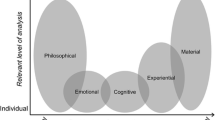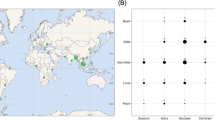Abstract
People’s livelihoods in tropical small-island developing states are greatly dependent on marine ecosystem services. Yet services such as fisheries and coastal buffering are being degraded at an alarming rate, thus making people increasing vulnerable to protracted and sudden environmental changes. In the context of the occurrences of extreme events such as earthquakes and tsunamis, it is vital to uncover the processes that make people in these island states resilient, or not, to environmental disruptions. This paper compares people’s perceptions of social and environmental impacts after an extreme event in the Western Solomon Islands (11 different villages on 8 different islands) to better understand how knowledge systems influence the coupling of human and natural systems. We examine the factors that contributed to perceptions of respective recovery in the environmental versus the social domains across communities with different traditional governance and modernization characteristics in a tsunami impact gradient. First, we separately assessed, at the community and individual level, the potential determinants of perceived recovery in the environmental and social domains. At the community level, the average values of the perceived environmental and social recovery were calculated for each community (1 year after the tsunami), and at the individual level, normally distributed environmental and social recovery variables (based on the difference in perceptions immediately and 1 year after the tsunami) were used as dependent variables in two General Linear Models. Results suggest that environmental and social resilience are not always coupled correspondingly and, less unexpectedly, that asymmetries during recovery can occur as a result of the underlying social and ecological context and existing adaptive capacity. More generally, the study shows how by evaluating post-disturbance perceptional data in tsunami-affected communities, we can better understand how subjective perceptions of change can affect the (de)-coupling of human and natural systems.


Similar content being viewed by others
References
Abramson DM, Stehling-Ariza T, Park YS, Walsh L, Culp D (2010) Measuring individual disaster recovery: a socioecological framework. Disaster Med Public Health Prep 4:46–54. doi:10.1001/dmp.2010.14
Adger WN (2000) Social and ecological resilience: are they related? Prog Hum Geogr 3:347–364
Adger WN, Hughes TP, Folke C, Carpenter SR, Rockström J (2005) Social–ecological resilience to coastal disasters. Science 309:1036–1039
Aldrich DP (2013) Social capital in post disaster recovery. Major disaster & resilience of society lessons learnt from the past, for the future, Department Of Civil Engineering, The University of Tokyo
Armitage D, Johnson D (2006) Can resilience be reconciled with globalization and the increasingly complex conditions of resource degradation in Asian coastal regions?. Ecol Soc 11(1):2. http://www.ecologyandsociety.org/vol11/iss1/art2/
Aswani S (2002) Assessing the effects of changing demographic and consumption patterns on sea tenure regimes in the Roviana Lagoon, Solomon Islands. Ambio 31:272–284
Aswani S, Lauer M (2014) Indigenous people’s detection of rapid ecological change. Conserv Biol 28:820–828
Barbier EB, Koch EW, Silliman BR, Hacker SD, Wolanski E, Primavera J, Granek EF, Polasky S, Aswani S, Cramer LA, Stoms DM, Kennedy CJ, Bael D, Kappel CV, Perillo GME, Reed DJ (2008) Coastal ecosystem-based management with non-linear ecological functions and values. Science 319:321–323
Barnett J (2001) Adapting to climate change in Pacific Island countries: the problem of uncertainty. World Dev 29:977–993
Bell JD, Kronen M, Vunisea A, Nash WJ, Keeble G, Demmke A, Pontifex S, Andréfouë S (2009) Planning the use of fish for food security in the Pacific. Mar Policy 33:64–76
Bellwood DR, Hughes TP, Folke C, Nyström M (2004) Confronting the coral reef crisis. Nature 429:827–833
Berkes F, Colding J, Folke C (2003) Navigating social–ecological systems: building resilience for complexity and change. Cambridge University Press, Cambridge
Boruff BJ, Cutter SL (2007) The environmental vulnerability of Caribbean island nations. Geogr Rev 97:24–45
Briguglio L (1995) Small island developing states and their economic vulnerabilities. World Dev 23:1615–1632
Brookfield HC, Hart D (1971) Melanesia: a geographical interpretation of an island world. Methuen, London
Carlsen HK, Gislason T, Benediktsdottir B, Kolbeinsson TB, Hauksdottir A, Thorsteinsson T, Briem H (2012) A survey of early health effects of the Eyjafjallajökull 2010 eruption in Iceland: a population-based study. BMJ Open 2(2):e000343
Census National (2009) Report on 2009 population and housing census. Solomon Islands National Statistics Office, Honiara
Cinner J, Huchery C, Darling ES, Humphries AT, Graham NAJ, Hicks CH, Marshall N, McClanahan TR (2013) Evaluating social and ecological vulnerability of coral reef fisheries to climate change. PLoS ONE 8(9):e74321. doi:10.1371/journal.pone.0074321
Constanza R, Farley J (2007) Ecological economics of coastal disasters: introduction to the special issue. Ecol Econ 63:249–253
Ewing L, Flick RE, Synolakis CE (2010) A review of coastal community vulnerability toward resilience benefits from disaster reduction measures. Environ Hazard 9:222–232
Folke C (2006) Resilience: the emergence of a perspective for social–ecological systems analyses. Glob Environ Chang 16:253–267
Folke C, Carpenter SR, Walker BH, Scheffer M, Elmqvist T, Gunderson LH, Holling CS (2004) Regime shifts, resilience and biodiversity in ecosystem management. Annu Rev Ecol Evol Syst 35:557–581
Folke C, Hahn T, Olsson P, Norberg J (2005) Adaptive governance of social–ecological systems. Annu Rev Environ Resour 30:441–473
Furusawa T, Furusawa H, Eddie R, Tuni M, Pitakaka F, Aswani S (2011) Communicable and non-communicable diseases in the Solomon Islands villages during recovery from a massive earthquake in April 2007. N Z Med J 124:28
Hanna SS, Folke C, Maler KG (eds) (1996) Rights to nature: ecological, economic, cultural, and political principles of institutions for the environment. Island Press, Washington
Hiwasaki L, Luna E, Syamsidik Shaw R (2014) Process for integrating local and indigenous knowledge with science for hydro-meteorological disaster risk reduction and climate change in coastal and small islands communities. Int J Disaster Risk Reduct 10:15–27
Holling CS (1986) The resilience of terrestrial ecosystems: local surprise and global change. In: Clark WC, Munn RE (eds) Sustainable development of the biosphere. Cambridge University Press, Cambridge, pp 292–317
Kuruppu N, Liverman D (2011) Mental preparation for climate adaptation: the role of cognition and culture in enhancing adaptive capacity of water management in Kiribati. Glob Environ Chang 21:657–669
Lauer M, Albert S, Aswani S, Halpern B, Campanella L, La Rose D (2013) Globalization, Pacific islands, and the paradox of resilience. Glob Environ Chang 23:40–50
Lewis J (1990) The vulnerability of small island states to sea level rise: the need for holistic strategies. Disasters 14:241–249
Liu JG, Dietz T, Carpenter SR, Alberti M, Folke C, Moran E, Pell AN, Deadman P, Kratz T, Lubchenco J, Ostrom E, Ouyang Z, Provencher W, Redman CL, Schneider SH, Taylor WW (2007) Complexity of coupled human and natural systems. Science 317:1513–1516
Marin A, Gelcich S, Castilla JC (2014) Ecosystem services and abrupt transformation in a costal wetland social-ecological system: tubul-Raqui after the 2010 earthquake in Chile. Ecol Soc. doi:10.5751/ES-05633-190122
McAdoo BG, Moore A, Baumwoll J (2009) Indigenous knowledge and the near field population response during the 2007 Solomon Islands tsunami. Nat Hazard 48:73–83
McMillen HL, Ticktin T, Friedlander A, Jupiter SD, Thaman R, Campbell J, Veitayaki J, Giambelluca T, Nihmei S, Rupeni E, Apis-Overhoff L, Aalbersberg W, Orcherton DF (2014) Small islands, valuable insights: systems of customary resource use and resilience to climate change in the Pacific. Ecol Soc 19(4):44. doi:10.5751/ES-06937-190444
Miller K, Charles A, Barange M, Brander K, Gallucci VF, Gasalla MA, Kahn A, Munro G, Murtugudde R, Ommer RE, Perry RI (2010) Climate change, uncertainty and resilient fisheries: institutional responses through integrative science. Prog Oceanogr 87:338–346
Minamoto Y (2010) Social capital and livelihood recovery: post-tsunami Sri Lanka as a case. Disaster Prev Manag 19:548–564
Ohta Y, Araki K, Kawasaki N, Nakane Y, Honda S, Mine M (2003) Psychological distress among evacuees of a volcanic eruption in Japan: a follow-up study. Psychiatry Clin Neurosci 57:105–111
Orlove B, Wiegandt E, Luckman BH (eds) (2008) Darkening peaks: glacial retreat, science and society. University of California Press, Berkeley, pp 3–19
Patankar V, D’Souza E, Alcoverro T, Rohan A (2015) Erosion of traditional marine management systems in the face of disturbances in the Nicobar Archipelago. Hum Ecol. doi:10.1007/s10745-015-9781-x
Pelling M, Uitto JI (2001) Small island developing states: natural disaster vulnerability and global change. Glob Environ Chang Part B: Environ Hazard 3:49–62
Renaud FG, Birkmann J, Damm M, Gallopin GC (2010) Understanding multiple thresholds of coupled social-ecological systems exposed to natural hazards as external shock. Nat Hazard 55:749–763
Schwarz AM, Béné C, Bennett G, Boso D, Hilly Z, Paul A, Posala R, Sibiti S, Andrew NL (2011) Vulnerability and resilience of remote rural communities to shocks and global changes: empirical analysis from the Solomon Islands. Glob Environ Chang 21:1128–1140
Solomon Islands Government (2007) Recovery action plan: western and choiseul provinces earthquake and tsunami. Solomon Islands Government, Honiara
St. Bernard G (2004) Toward the construction of a social vulnerability index—theoretical and methodological considerations. Soc Econ Stud 53(2):1–29
Stanton RL, Bell JD (1969) Volcanic and associated rocks of the New Georgia group, British Solomon Islands Protectorate. Her Majesty’s Stationary Office, London
Turner BL, Kasperson RE, Matson PA, McCarthy JJ, Corell RW, Christensen L, Eckley N, Kasperson JX, Luers A, Martello ML, Polsky C, Pulsipher A, Schiller A (2003) A framework for vulnerability analysis in sustainability science. PNAS 100:8074–8079
Acknowledgements
We thank the people of the Western Solomon Islands for their assistance and continued support. The National Science Foundation (Grant NSF-HSD-BCS-0826947) generously provided funds for this research.
Author information
Authors and Affiliations
Corresponding author
Rights and permissions
About this article
Cite this article
Aswani, S., van Putten, I. & Miñarro, S. Environmental and social recovery asymmetries to large-scale disturbances in small island communities. Nat Hazards 86, 241–262 (2017). https://doi.org/10.1007/s11069-016-2685-2
Received:
Accepted:
Published:
Issue Date:
DOI: https://doi.org/10.1007/s11069-016-2685-2




